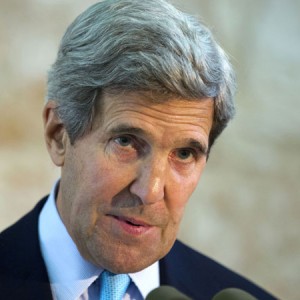BANDAR SERI BEGAWAN— Fresh from tough Middle East talks, US Secretary of State John Kerry was due to touch down in Brunei Monday for meetings with Asia-Pacific nations bedevilled by divisive issues of their own.
Kerry will join foreign ministers from China, Japan, Russia and across the Asia-Pacific for an annual security forum in which he will be keen to stress that Washington is sincere in its promised “pivot” toward Asia.
As expected, the meetings look to revolve in large part around regional concerns over China’s rise.
During kick-off talks on Sunday between the 10-member Association of Southeast Asian Nations (ASEAN), the Philippines accused China of a “massive” military buildup in the disputed South China Sea, which it said threatened peace.
China, which claims virtually all of the strategic waterway, has been at odds with rival claimants, particularly the Philippines and Vietnam, leading to tense confrontations at sea and allegations of aggressive Chinese bullying.
“The Philippines views with serious concern the militarisation of the South China Sea,” Foreign Secretary Albert Del Rosario told his ASEAN counterparts.
“The overwhelming presence of Chinese ships, including military and paramilitary ships, and the issuance of threats pose serious challenges for the region as a whole.”
Temperatures have also risen in the East China Sea amid rival claims by Beijing and Tokyo to remote, uninhabited islands.
On Monday, Kerry was scheduled to meet with his Japanese and South Korean counterparts and hold talks with the ASEAN grouping, followed a day later by a meeting with Chinese Foreign Minister Wang Yi.
However, Kerry is rushing to make it to Brunei, this year’s forum host, after extending a Middle East stop in a marathon bid to revive direct peace talks between Israel and the Palestinians that yielded no signs of a breakthrough.
While putting a personal priority on peace in the Middle East, Kerry has insisted Washington is not ignoring Asia.
But even in Brunei, his focus will not be solely on Asia as he is also expected to meet Russian Foreign Minister Sergei Lavrov amid tensions over the Syria war and the presence in Moscow of fugitive US intelligence leaker Edward Snowden.
The Snowden affair has put stress on US relations with Moscow and Beijing, which Washington accuses of letting Snowden slip out of Hong Kong en route to Moscow.
Japan’s foreign minister was also expected to hold direct talks with his South Korean counterpart Monday for the first time since each country recently voted in new governments.
The meetings began with a gathering of ASEAN on Sunday, with China joining later in the day, and expand Monday to include the United States and others before wrapping up with an East Asia meeting bringing together foreign ministers from 26 countries and the European Union.
